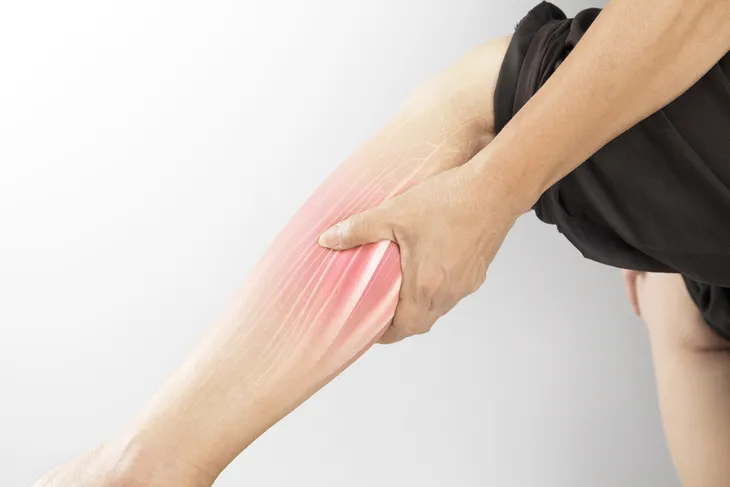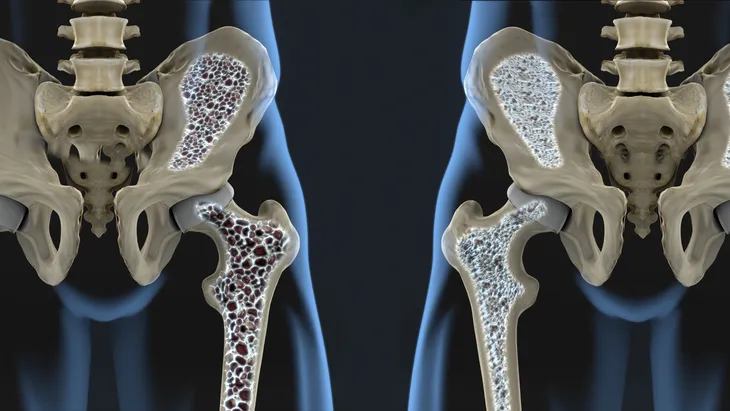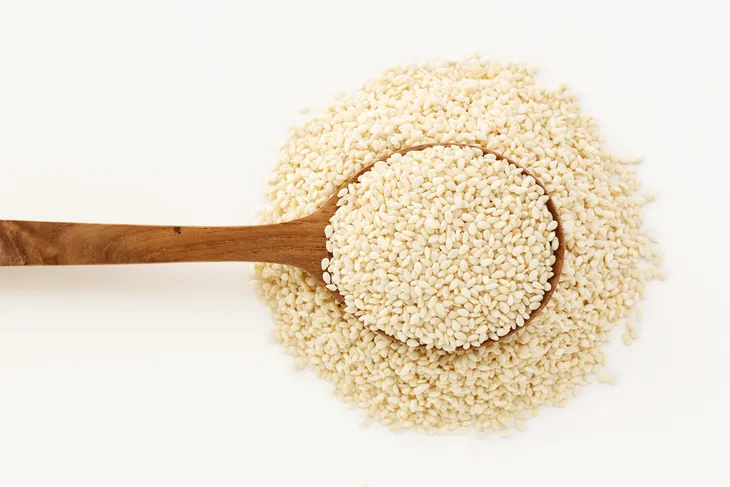The signs and symptoms of magnesium deficiency are vast. Some are subtle, while others can cause serious health problems. Many people who have a deficiency don’t even know it, and a lot of health issues are blamed on something else or remain unexplained if a potential magnesium deficiency is overlooked. It typically results from not having enough of the nutrient in your diet, or if your body doesn’t absorb enough when it goes through your system. Other factors like consuming too much alcohol or certain medication can also deplete the body’s magnesium.
Magnesium plays an integral role in your body’s ability to keep your heart, kidneys, and muscles healthy. It also regulates nutrient levels, and keeps bones strong. Since this mineral is so important, let’s get informed on not only the warning signs of a magnesium deficiency, but the foods we should be eating and the potential treatment options…
Think you have a magnesium deficiency? Try Doctor’s Best High Absorption Magnesium Supplements – A 4+-star Amazon product with over 5,500 consumer reviews. (As an Amazon Associate this site earns from qualifying purchases.)
Warning Signs
1. Muscle Spasms and Cramps
Muscle spasms and cramping can not only be uncomfortable but also quite painful. They’re uncontrollable and unpredictable, and they’re not something you can simply ignore and get on with your day. While athletes often suffer from muscle cramps due to inadequate stretching, dehydration, over-exertion, and lack of proper diet, many other people suffer from them and it can be hard to figure out why and how to prevent them. When a magnesium deficiency worsens, muscle spasms and cramping can be a sign of the lacking nutrient. So if you suffer from regular cramping and spasms, this could be a warning sign of low magnesium levels.
While getting your magnesium levels to where they should be will likely ease your symptoms, you can try to get short-term relief by stretching and massaging the affected muscles. Vitamins D, E and B complex also play a role in preventing muscle cramps, so make sure you get your daily recommended dose of these vitamins to help ward off cramping.
2. Fatigue
Being tired and feeling lethargic is not uncommon, and it can be easy to blame fatigue on several factors–from stress at work or a busy schedule to not sleeping well or running around with your kids. But one of the most common and early symptoms of a magnesium deficiency is fatigue. Because just about everyone feels tired at some point and the cause could be from so many different things, it’s difficult to come to the correct diagnosis. A magnesium deficiency likely isn’t the first thing your doctor is going to check. And unfortunately, the fatigue won’t go away until your body gets the right amount of magnesium in its system.
Since magnesium helps produce and transport energy, an insufficient level can easily result in feeling tired and weak. To keep your energy levels where they should be, you need to be getting enough magnesium. If you aren’t low in magnesium but experience fatigue often, sometimes magnesium supplements can be used to relieve fatigue. Talk to your doctor before starting any new supplements.
3. Arrhythmia
Magnesium plays a vital role in overall heart health. It’s vital for proper muscle contraction, and a low level can affect your body’s most important muscle – your heart. Arrhythmia is an irregular heartbeat, and magnesium directly helps you maintain a normal heart rhythm. Some studies have shown that maintaining a regular level of magnesium may even prevent some heart problems and diseases, including arrhythmia. In fact, magnesium is often used in medical settings when managing patients with arrhythmia.
There have been a lot of studies focused on how magnesium affects your heart, specifically if it can prevent heart disease or lower the risk of heart attack. While nothing is guaranteed and no heart is the same, some of these studies have shown a positive effect on heart health and prevention of heart disease with an increased magnesium intake. Some doctors even prescribe magnesium for patients who are at risk of cardiac arrhythmia.
4. Dizziness
Sometimes dizziness hits you when you stand up too fast and it quickly goes away, but it could be due to a magnesium deficiency. If this is the case, unfortunately it won’t disappear on it’s own and can last all day without relief. Similar to fatigue, it can be hard for your doctor to diagnose because so many things can cause dizziness. As a result, magnesium deficiency is often overlooked when trying to diagnose and fix the problem. Low magnesium levels can give you similar feelings as vertigo, making you feel not only dizzy, but completely off balance. If you’re experiencing dizziness, it could be a warning sign of magnesium deficiency.
As a magnesium deficiency worsens, so do the symptoms. You could experience light and manageable dizziness in the beginning, but it can fully transform into vertigo if your levels continue to decline. Vertigo can completely alter your life. It could make you unable to do regular day to day activities and miss work when it’s at its worst. If you’re experiencing dizziness, it’s worth a visit to your doctor.
5. Nausea and Vomiting
Similar to vertigo, if you have a low magnesium level, you may experience nausea, and even vomiting. Although these symptoms are considered an early warning sign, they are not necessarily a severe symptom of magnesium deficiency. Constantly feeling nauseous and vomiting is quite simply unpleasant – even if they aren’t considered severe symptoms – and can greatly impact your routine. For those who suffer from regular nausea and/or vomiting, it’s worth asking your doctor about other potential causes, such as magnesium deficiency. Like many other symptoms, there can be a variety of causes and your magnesium level may be overlooked.
Another possible cause of nausea and vomiting, which is related to magnesium, is that you could experience nausea if your magnesium levels are too high. Other supplements and certain types of medication could cause your magnesium levels to spike if you’re taking a magnesium supplement.
6. Numbness
Magnesium is one of the most abundant and important minerals in your body. It’s responsible for over 300 biochemical reactions, so it’s not hard to believe that having a deficiency can greatly impact your overall health. Since magnesium impacts your nervous system, tingling and numbness can be a warning sign of a deficiency, particularly as it worsens. Without sufficient magnesium in the body, it can prevent nerve and muscle functions to act and react properly. A lack of magnesium can also prevent your body from sending the proper signals, resulting in numbness and tingling. It’s common to feel these symptoms in your face, feet and hands.
Although severe symptoms like numbness are rare, experiencing it can be quite scary. Numbness is not something to take lightly and there are a number of reasons it could be happening, all of which go way beyond a simple magnesium deficiency. It is important to see your doctor and figure out the cause.
7. Personality Changes
It might seem bizarre and definitely not the first cause you’d jump to, but believe it or not, personality changes are a warning sign of a magnesium deficiency. Significant personality changes, including abnormal amounts of confusion and irritability, can seem to come out of nowhere. Simple things can seem overwhelming and make you feel out of sorts. You’ll likely be able to notice the change, but are unsure of how to fix it. Since many things can cause symptoms like this, a magnesium deficiency is often not considered when trying to diagnose the change in personality.
On top of these personality changes and periodical mood swings, the lack of sleep discussed earlier could cause a mood change if it happens often, ultimately affecting both your personal and professional relationships. Since sleep is vital for your mental, physical and emotional health, so if a magnesium deficiency is what’s keeping you up at night it’s important you get your magnesium up to a sufficient and healthy level.
8. Anxiety and Panic Attacks
Everyone experiences a bout of anxiety or panic once in a while, but if you’re experiencing it regularly, it could be due to a magnesium deficiency. You may be quick to blame everyday stress, but you should also consider the role a magnesium deficiency has in causing anxiety and panic attacks, especially if you aren’t typically prone to panic and anxiety. Unfortunately, if you’re suffering from anxiety, the stress can dwindle your magnesium levels, making it a vicious cycle. Low magnesium causes anxiety and depletes your magnesium reserves during the attack.
There are a lot of different symptoms of a panic attack, some of which include difficulty breathing, a racing heart, chest pains, an intense rush of fear or dread, tingling in your limbs and trembling, among other uncomfortable and terrible feelings. Although they typically only last a few minutes, each second can feel like a lifetime and you end up feeling completely emotionally drained. They typically only last a few minutes but each second can feel like a lifetime. Talk to your doctor if you experience these symptoms, especially if they happen often.
9. Insomnia
Having a magnesium deficiency can cause insomnia in several different ways. As we mentioned earlier in this article, low levels of magnesium can result in muscle spasms. This is because the body needs a sufficient amount of magnesium in order to control electrical conduction in the neurons in the muscles which will then lead to a prolonged opening of calcium channels and increasing muscular activity. This causes restless leg syndrome, a condition that causes the legs to move involuntarily during the night.
This form of insomnia caused by a magnesium deficiency in indirectly related, but a lack of magnesium is also known to directly cause insomnia as well.
10. High Blood Pressure
A study published in the American Journal of Hypertension conducted an experiment where the correlation between level of blood pressure and levels of magnesium intake were analyzed. The results were that the individuals with the healthiest the blood pressure, had the highest levels of magnesium. As a result, those with low levels of magnesium had high blood pressure.
A study published in the American Journal of Clinical Nutrition concluded that eating magnesium rich foods and approximately 100 mg a day, would decrease the risk of having a stroke by 8 percent.
11. Type II Diabetes
This symptom sounds strange, but when explained it actually makes a lot of sense. A study published in the Journal of Internal Medicine found that magnesium plays a significant role in metabolising sugar, and since type II diabetes is something that develops based on an individual’s diet, a lack of magnesium could play an important role in the development of this condition.
It should be noted that low levels of magnesium are found in pre-existing diabetic, but low levels of magnesium are 10 times higher in individuals that are newly diagnosed with type II diabetes. Eating a magnesium rich diet consisting of nuts, whole grains, leafy vegetables and beans could prevent any potential risk of type II diabetes.
12. Osteoporosis
A deficiency in magnesium can also increase your risk of developing bone problems like osteoporosis, “a disease characterized by low bone mass and deterioration of bone tissue, which can lead to increased risk of fracture,” defines Osteoporosis Canada.
There are a couple of reasons for this, the first of which is that the bones store large amounts of magnesium, so when levels of the mineral are low for a prolonged period of time it can lead to bone loss. Another reason is that a magnesium deficiency can lower the level of calcium in the blood, and calcium is essential to the maintenance of strong bones.
13. Migraines
It’s normal for most anyone to have headaches on occasion. But if you find yourself suffering from them on a regular basis, however, consider bypassing the painkillers and visiting your doctor about a possible magnesium deficiency.
Livestrong.com explains that a magnesium deficiency can cause headaches “due to the dilation of blood vessels” and that “nearly half of the people suffering from migraine headaches show to have a low amount of ionized magnesium in their blood.” A blood test will be conducted to confirm the cause and ensure appropriate treatment options are recommended.
14. Constipation
There are a wide variety of reasons you may be experiencing constipation, from stress to inadequate fiber intake or consuming too much dairy. Certainly having a magnesium deficiency isn’t the first culprit to come to mind, but it may very well be why you’re having trouble passing bowel movements.
Magnesium has a relaxing effect on many parts of the body, including the digestive tract. So if you’re not getting enough of the mineral, these muscles contract more, making it difficult for waste to move through the system, thus resulting in constipation.
15. Acid Reflux
As previously mentioned, magnesium plays a key role in muscle relaxation throughout the body. This includes the valves at the top and bottom of the stomach, which allow food to move through the body, as it should.
If you have a magnesium deficiency, however, NaturalLife.org says these sphincters “cannot properly contain the food,” thus allowing food and stomach acid to backflow into the esophagus. This results in a burning sensation that we call acid reflux or heartburn. Unfortunately, if the cause of your acid reflux is a magnesium deficiency, the source indicates that most over-the-counter medications can actually worsen these symptoms. So be sure to speak with your physician before self-medicating to remedy the problem.
Foods You Should Be Eating
16. Avocados
Avocado, the popular fruit that’s most known for its role in guacamole, tastes more like a vegetable and makes a great addition to any sandwich or salad. But did you know that it’s absolutely jam-packed with magnesium?
Avocados are also a great source of potassium and protein, which helps keep us feeling full and aids in the muscle-building process. Just keep in mind that, unlike most fruits and vegetables, avocados are high in fat. Generally speaking, this is the “good” fat — it’s unsaturated fat — but it’s still a good idea to consume them in moderation.
17. Leafy Vegetables
It may come as no surprise that dark, leafy veggies like swiss chard, kale, and spinach are packed with magnesium. These kinds of vegetables, which have been considered “superfoods” for some time now, make an excellent addition to just about any dish. Not only are they high in magnesium, which can help regulate blood sugar and blood pressure levels, but they contain virtually no calories or fat.
Of course, that means they may not be very popular with every member of your family, especially the little ones. To mask the bold and sometimes bitter flavor of dark, leafy veggies like kale and spinach, cut them up into small pieces and try slipping them into particularly spicy dishes, like spaghetti sauce, curry, or chili. If you’re adding these superfoods to a smoothie — and that’s an excellent idea — you can mask their flavor by adding fruit like bananas, strawberries, blueberries, and raspberries.
18. Cashews
Magnesium is present in high quantities in cashews, the delicious, buttery-tasting nuts. And because magnesium plays an important role in regulating blood-sugar and blood-pressure levels, that means cashews can help individuals with high cholesterol, hypertension, and other significant heart health issues.
Of course, like some of the other food items on this list — like dark chocolate and avocados — cashews are high in fat and calories. That means a handful of them each day should be enough to get the benefits of magnesium without introducing new health concerns.
19. Tuna Fish
The tuna is one very popular fish. Whether consumed raw in sushi or mixed with mayonnaise and dill in a tuna sandwich, it’s arguably the most versatile sources of protein out there. But it’s also jam-packed with magnesium, which can help people with diabetes and heart conditions regular their blood sugar and blood pressure levels.
Of course, tuna fish isn’t the perfect food item. While it’s high in protein and magnesium and low in calories and fat, it can contain significant amounts of mercury, which is very unhealthy if consumed in high quantities. Meanwhile, canned tuna — easily the most popular and affordable way to get tuna — contains lots of added salt, which will be a problem for people with heart conditions. So, try to limit your consumption of tuna and try to stick to the fresh variety.
20. Flaxseeds
Flaxseeds, like some of the other foods on this list, have qualified for “superfood” status in recent years. There’s a few reasons for this: first, they’re high in omega-3 fatty acids, which have been shown to improve heart health and boost brain functionality. Second, they’re high in protein, which can keep you going and curb cravings for less healthy food items. Finally, flaxseeds are very high in magnesium, which can help regulate blood sugar and blood pressure levels.
Flax seeds don’t exactly bounce with flavor, so consider adding them to mixed dishes, like salads, sauces, and cereals. You can also find flaxseed in many whole grain breads and it’s available in oil and pill form for quick consumption.
21. Pumpkin Seeds
Every October brings a new Halloween and, for many people, lots of pumpkin carving. That means lots of scooping out pumpkin guts and, if you’re smart, separating out and roasting the pumpkin seeds. With a bit of oil and salt — and perhaps a dash of garlic powder — roasted pumpkin seeds make for a delicious snack.
But you shouldn’t restrict your consumption of pumpkin seeds to the weeks surrounding Halloween. That’s because they’re very high in magnesium, which can help your body in a variety of ways. Just make sure to leave on the shells, which contain many of the most helpful nutrients found in pumpkin seeds.
22. Dark Chocolate
As if anyone needed another reason to eat chocolate! Surprisingly, dark chocolate contains a significant amount of magnesium. However, this depends largely on the cocoa percentage — the higher, the better, with over 60 per cent being ideal. This means the (generally more popular) milk chocolate won’t do you much good.
That said, even dark chocolate has its drawbacks. Like milk chocolate, it’s high in fat, sugar and calories. For these reasons, it’s best to consume it in moderation — in other words, just because dark chocolate is rather high in magnesium doesn’t mean you can binge on it!
23. Legumes
The word legumes is an umbrella term for several different foods like lentils, beans, chickpeas, peas, and soybeans. Basically any and all of these foods are rich in magnesium. Healthline points out that 1-cup of cooked black beans can provide 120-mg of magnesium which is 30-percent of the daily recommended amount.
In addition to being high in magnesium, legumes are also rich in fiber and high in potassium and iron. This makes them a great source of protein for vegetarians. “Because legumes are rich in fiber and have a low glycemic index (GI), they may lower cholesterol, improve blood sugar control and decrease heart disease risk,” writes Healthline.
24. Tofu
Unless you’re a vegan or vegetarian, you probably don’t eat tofu all that often. However that might change after hearing what we have to say next. Not only is tofu a great source of protein, especially in lieu of meat, it’s also a good source of magnesium. Health.com points out that ½ cup of tofu adds up a whopping 37-milligrams of magnesium.
In addition to that, a ½ of tofu provides 43-percent of the recommended daily amount of calcium and a good amount of iron. “You also get a dose of iron, a mineral the body needs to produce hemoglobin — the protein that helps red blood cells deliver oxygen throughout the body,” writes the source.
25. Whole Grains
We are usually told to steer clear of any and all kinds of bread, but in reality, as long as you’re eating whole grain bread and not white bread, it can provide some much-needed health benefits. Whole grains are full of nutrients, including magnesium. According to Healthline, 1-ounce serving of dry buckwheat bread (28-grams) provides 65-mg of magnesium which is 16-percent of our daily recommended amount.
Some other great benefits are that whole grains have shown to reduce inflammation and the risk of heart disease. “Pseudocereals like buckwheat and quinoa are higher in protein and antioxidants than traditional grains like corn and wheat,” writes the source. People with a gluten sensitivity can still reap the benefits because there are gluten-free options.
26. Fatty Fish
According to the American Heart Association (AHA), we should all be eating fatty fish at least two times a week. The best fatty fish to eat to get the most health benefits are fish like mackerel, wild salmon, halibut, and tuna. These all contain a healthy dose of magnesium, as well as vitamin D and omega-3 fatty acids, says Everyday Health.
When it comes to magnesium, Healthline points out that half a fillet (178-grams) of salmon contains 53-mg of magnesium which is about 13-percent of the recommended daily intake. It also provides 39-grams of protein. Fatty fish like salmon will also provide potassium, selenium, B vitamins, and other nutrients, says the source. Eating these types of fish has also been linked to lowered risk of chronic diseases like heart disease.
27. Bananas
Bananas are usually associated with their bone-strengthening potassium levels, but that’s not all they are good for! This peelable fruit is also “one of the best sources of resistant starch, a healthy carb that fills your belly and fires up your metabolism,” writes Health.com. The source also points out that one medium-sized banana contains 33-milligrams of magnesium, is about only 100-calories, and contains vitamin C and fiber.
You can easily enjoy this fruit on the go, as a light breakfast, or even add it to other meals like oatmeal, toast, smoothies and cereal. If you’re not a huge fan of bananas, you can also get a decent amount of magnesium from strawberries, blackberries, grapefruit, tangerines, and figs, says Everyday Health.
28. Soybeans
Soybeans aren’t the most popular food, but those who like them are in for a real treat because they’re one of the most magnesium-rich foods out there! Not only that, but Everyday Health also states that they are high in fiber, vitamins, minerals and amino acids (the building blocks of protein).
For a healthy snack midway through the day, munch on about ½ cup of dry roasted soybeans to be “a rich source of energy, magnesium, and protein, or add fresh soybeans (edamame) to your shopping list,” writes the source.
Don’t like soybeans? No problem! Everyday Health defers you to try similar magnesium-rich foods like black beans, kidney beans, white beans, chickpeas, black-eyed peas, or lentils.
29. Almonds
Almonds are probably one of the most popular nuts, especially when it comes to snacking. They are super easy to eat on the go, they are fairly bland in taste and they’ve got lots of good health benefits. The only downside of almonds is that we have to be careful not to eat too many. Their benefits can only be enjoyed if they’re eaten in moderation.
Health.com explains that almonds are rich in “vitamin E, an antioxidant that keeps the immune system strong and eyes healthy.” It also states that they contain lots of protein and heart-healthy omega-3 fatty acids. But the real reason this nut lands on this list is because in only ¼ cup there is 105-milligrams of magnesium!
30. Sesame Seeds
Sesame seeds are teeny tiny little seeds that we often don’t really give much thought to. We don’t usually eat them on their own or add them into cooking all that often, but they are often found in various dishes, on bagels, in salads, or even on crackers.
Despite their small size, these little seeds have some pretty big health benefits. Health.com points out that 1-ounce of roasted sesame seeds contains a whopping 101-milligrams of magnesium! They’re also chock-full of zinc, iron, and vitamin B-6.
Treatments
31. Eat it Up
FoodRenegade.com says it’s as easy as changing up your diet – well, it may not be so easy for some, but it’s definitely worth a try. The source says that foods with the most magnesium include cooked spinach, black beans, halibut, almonds, brown rice, and cashews.
There are number of seeds you can pick up from the grocery store that will also pack magnesium, such as pumpkin seeds, flax seeds and sunflower seeds, adds the source. Some good news – if you’re more of a chocolate lover, you can get magnesium from dark chocolate.
32. Spray it On
Apparently, magnesium ingested orally is actually not the most efficient way for your body to absorb it, at least according to Dr. Axe. It notes that a 2010 study found those who used “transdermal magnesium therapy” saw increases (of 25.2-percent) in their cellular magnesium levels after 12-weeks.
So… how do you apply this oil? The source notes there are actually a number of ways: you can spray it directly onto your skin (the most common application), use it as massage oil, use it as a “sports rub” (the source suggests wintergreen, an essential oil), or taking a bath in diluted magnesium chloride.
33. Soak it Up
Further to that last point about absorbing magnesium while spending some quality time in the tub, Food Renegade says that you can take an Epsom salt bath to help cure your deficiency. “Epsom salts aren’t actually salts at all, but magnesium sulfate,” notes the source. They got their name from their place of discovery – Epsom, England.
What better way to get your magnesium fix than relaxing in a nice, warm tub with a book? “Epsom salt baths don’t just calm noisy souls, they improve health as well,” it notes. Just make sure you tell your family to leave alone for a while… for the good of your health, of course.
34. Scale it Back
Okay, this one isn’t exactly a “treatment,” it’s an adjustment that can help magnesium thrive better in your system. LiveStrong says ingesting the right amount of calcium and magnesium is a “balancing act,” as you need magnesium to metabolize calcium.
However, if your calcium intake is too high, you need to make sure you’re getting adequate magnesium or you could become depleted. The source says the recommended daily intake of calcium to magnesium ranges from 2.5-to-1 to 4-to-1 (depending on age and gender). So be mindful of any calcium supplements you’re taking or if you eat a lot of dairy – you might want to turn to the above remedies to ramp up magnesium to offset it (or scale back the calcium if your doctor says it’s OK).
35. Get Fermented
BodyEcology.com says you can turn to fermented food products to give your essential functions a magnesium jolt. These fermented products “populate your gut with probiotics” – the good bacteria and yeast – notes the source.
While they might not have any magnesium content on their own, these products help your body absorb more of the element from other sources, it explains. It even offers a handy list of fermented drinks to try (aside from beer). Kombucha, a fermented tea product, may also be a way to get more probiotics – and you can buy it premade at the grocery store. Bonus: it’s carbonated and comes in various flavors.
36. Take a Pill
You could turn to good ol’ over-the-counter supplements if the other methods fail, or you just like the idea of being able to take a pill (or drink a dissolved powder) and be done with it. WebMD offers guidelines for how much magnesium you should get per day based on your age and gender, but it’s the total of ALL sources, not just supplements.
It’s probably a good idea then to talk to a doctor or pharmacist about how much magnesium you should be ingesting as a supplement. “Excessive use of magnesium supplements can be toxic,” notes the source. The upper limit dosage for a supplement according to WebMD is 65-milligrams a day for children up to age 3, 110-milligrams a day for children ages 4-8, and 350-mg daily for adults (and children aged 9-and older).
Think you have a magnesium deficiency? Try Doctor’s Best High Absorption Magnesium Supplements – A 4+-star Amazon product with over 5,500 consumer reviews. (As an Amazon Associate this site earns from qualifying purchases.)







































